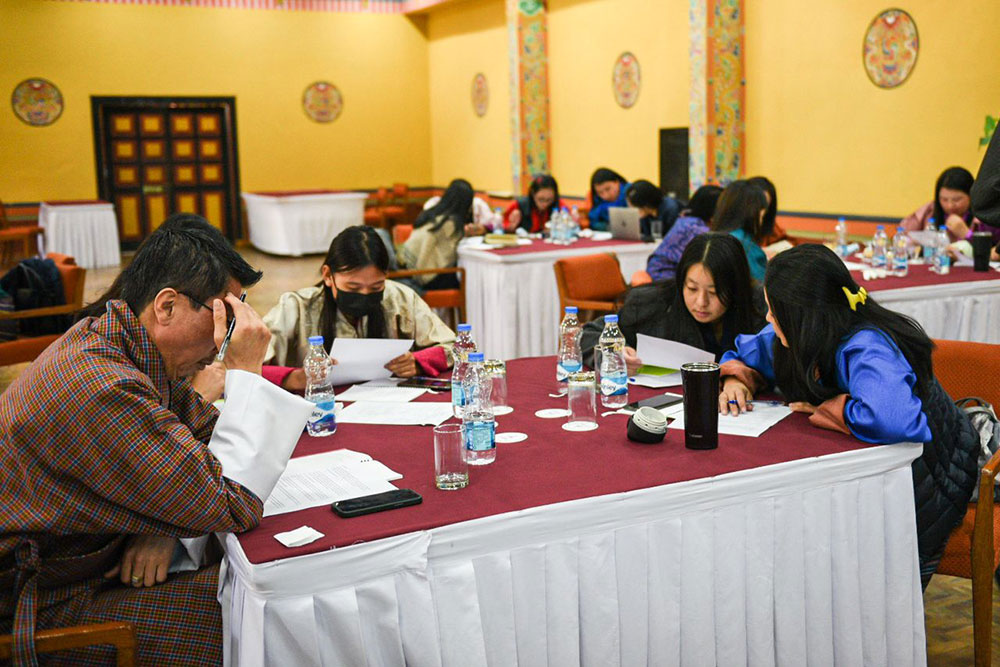Phub Dem | Paro
Some of issues highlighted at a training session about sexual harassment in the workplace include: unfamiliarity with legal details and rights regarding sexual harassment cases; where and whom to report them to; and a casual attitude towards sexual harassment. The training session was held for service providers in the private and corporate sector.
Organised by the Bhutan Chamber of Commerce and Industry (BCCI), women participants were vocal in saying that sexual harassment cases either went unnoticed and unreported because of lack of awareness, or employers took them lightly when reported.
The one day training targeted senior human resource officers and administrative officers of private and corporate sectors. A similar two-day training for spa and massage centres, drayangs and hotel industry is undergoing in Paro.
While some private firms did not even have a service rule book, those with service rules didn’t have provision on sexual harassment. Participants raised that implementation of the internal rules was lacking and relevant agencies should look into effective implementation of rules.
A hotel owner, Choney Dema, said that employees understand what sexual harassment is, but don’t know where and to whom to report to in the event such a case occurs. She said that reporting the cases to the police discourages the victim, adding that a focal person to hear such issues with the Hotel Association of Bhutan would be helpful. “There is no one to protect the employees. It is time we have a separate agency with a policy to look into it.”
A proprietor of a massage centre, Tshering Lhamo, said that therapists sometimes undergo verbal abuse. Given the nature of the job, there are protocols to deal with such incidents like talking with the client, reporting the incident to managers, and then to the police.
Spa owners shared that not knowing how and whom to report verbal and non-verbal harassment cases to, they usually ask the clients to leave the centre and do nothing about it.
According to an official with a security service provider Dawa Zam, while there are harassment clauses in the company’s service rules, they aren’t implemented. Although she received some cases where managers deliberately kept female security guards on night duty to harass them, the office could not pursue and forward the issues without “evidence”.
According to BCCI officials, the training aimed to help companies develop internal mechanisms for reporting sexual and other forms of harassment at workplaces. Mechanisms include appointment of a focal person or committee within the agency to facilitate reporting of harassment to the management and providing necessary support to victims.
“Companies should include sexual harassment provisions in the company’s service rules and provide gender-friendly facilities at the workplace,” said the official.
According to reports from the National Commission for Women and Children (NCWC), at least 40 to 60 percent of women face sexual harassment in the workplace. It states that the Thimphu police alone registered 13 cases of sexual harassment until November within this year.
NCWC’s Director General, Karma Drukpa, said that agencies’ internal frameworks or service rules should be reviewed to clarify civil and criminal cases.
At present, he said, the sexual harassment provisions under the Labour and Employment Act 2007 specify that it has to be graded as per the penal code of Bhutan. However, in the service rules and regulations of private and corporate agencies, such issues are dealt with by administrative tribunals and are treated as civil cases, which contradicts the provisions of the Penal Code of Bhutan.
He said that victims do not come forward out of fear of stigmatisation and repercussions from perpetrators. The lack of appropriate measures to ensure the protection of victims and witnesses discourages the victims from reporting the cases, he added. “Some agencies discourage employees from reporting harassment, and lack of support from agencies in taking the cases forward results in delays in providing required services to the victims.”
The training is a part of the BCCI’s involvement in a sustainable development services program on gender equality, diversity, and inclusion in the private sector. It was supported by the United Nations Development Program and the NCWC.


